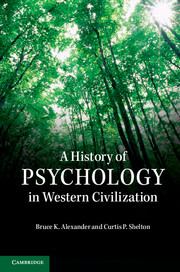Book contents
- Frontmatter
- Dedication
- Contents
- List of figures
- List of tables
- Preface
- Acknowledgements
- 1 Introduction: Two histories of Western psychology
- 2 Rationalism: Plato and the “just” person
- 3 Stoicism: Marcus Aurelius and the sufficient self
- 4 Christianity: St. Augustine and the incomplete soul
- 5 Materialism: Thomas Hobbes and the human machine
- 6 Empiricism: John Locke, David Hume, and experience as reality
- 7 Evolution: Charles Darwin and Homo sapiens as a work in progress
- 8 Medicine: Sigmund Freud and the world of neurotics
- 9 Re-imagining psychology
- Appendix A Plato’s nature of intelligence and other faculties
- Appendix B The search for Aunt Lena
- Index
- References
4 - Christianity: St. Augustine and the incomplete soul
Published online by Cambridge University Press: 05 July 2014
- Frontmatter
- Dedication
- Contents
- List of figures
- List of tables
- Preface
- Acknowledgements
- 1 Introduction: Two histories of Western psychology
- 2 Rationalism: Plato and the “just” person
- 3 Stoicism: Marcus Aurelius and the sufficient self
- 4 Christianity: St. Augustine and the incomplete soul
- 5 Materialism: Thomas Hobbes and the human machine
- 6 Empiricism: John Locke, David Hume, and experience as reality
- 7 Evolution: Charles Darwin and Homo sapiens as a work in progress
- 8 Medicine: Sigmund Freud and the world of neurotics
- 9 Re-imagining psychology
- Appendix A Plato’s nature of intelligence and other faculties
- Appendix B The search for Aunt Lena
- Index
- References
Summary
Two hundred years after Marcus Aurelius’ death, Christianity was no longer the religion of a persecuted minority. Roman Catholicism had become the official state religion of Rome and was rapidly replacing Stoicism as the dominant personal philosophy of Romans of all classes, from slaves to the very wealthy (Brown, 2012). Christianity changed the way that the ancient world thought about the fundamentals of life and has had an enormous impact on Western philosophy and psychology ever since.
As in previous chapters, the psychological perspective that was built into Christianity will be discussed as an outgrowth of the historical period in which it became widely accepted and in the words of a scholar who wrote one of its most enduring formulations. The historical period is the last decades of the collapsing Western Roman Empire. The scholar is Aurelius Augustinus (AD 354–430), a popular orator and teacher, later an influential bishop in North Africa, and now known as one of the great fathers of the Roman Catholic Church, St. Augustine of Hippo.
St. Augustine was born in Thagaste in the Roman North African colony of Numidia in AD 354. (Thagaste is now Souk Ahras, a city in northern Algeria.) St. Augustine was one of the privileged people of his era. His father was a Roman citizen and official, who was well enough connected to arrange a classical education for his son. Augustine was never enslaved, tortured, or caught up in war until the very last days of his life. Nonetheless, his life story is a saga of continuous dislocation and grief. The mission of the rulers of Numidia, puppets of the distant Roman state, was to exploit the local population in order to maximize grain shipments to Rome. In an age where people fought to the death over matters of religion, his mother and father were so fundamentally at odds in religious belief that he had to take sides, repudiating his father.
- Type
- Chapter
- Information
- A History of Psychology in Western Civilization , pp. 134 - 193Publisher: Cambridge University PressPrint publication year: 2014



